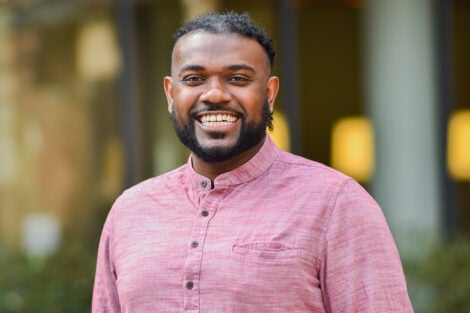By Joel Burt-Miller, MPH ’23
June 3, 2024 — I am about to begin an exciting new chapter of my career as one of 10 new residents in the U.S. pursuing dual training in family medicine and psychiatry. Reflecting on how I got to this point, I have learned some important lessons. I’ve laid them out here in the hopes they might resonate with others seeking to define their paths.
Define your life’s mission
My introduction to the field of public health came as a freshman at Brandeis University, in a course on inequities in health care and health outcomes. It ignited a flame in me and led me to define a clear mission for my life: I would advocate for the inequitably resourced, both locally and globally. I would serve and heal both individuals and communities. I would focus not just on treating disease, but on supporting a holistically healthy life.
My journey from that point took many twists and turns, but throughout, I held tight to that mission statement. It helped me evaluate each opportunity with clarity and purpose.
Be open to new interests
When I entered medical school at the University of South Carolina School of Medicine Greenville, I planned to go into primary care. Then came the COVID-19 pandemic, which also exposed an ongoing mental health crisis. I became invested in finding a solution. I designed a research study based on the South African philosophy of Ubuntu that used small groups, called Ubuntu groups, to effectively address the social isolation and burnout experienced within my learning community while promoting a sense of belonging. That project sparked my interest in psychiatry. Yet, I remained committed to preventive medicine as well.
Was it possible to accommodate my interest in both fields of medicine? Through a quick Google search, sure enough, I found five residency programs combining family medicine and psychiatry.
Seek mentors (even when it’s daunting!)
The existence of these programs was promising — but I wanted to know more. With piqued curiosity, I entered the same search terms, “family medicine and psychiatry,” on LinkedIn. To my delight, someone popped up: Rohit Abraham. His bio described him as a ‘Combined Psychiatry & Family Medicine Resident at Boston Medical Center.’
I decided to take a leap of faith. Though I’d never met Rohit, I sent him a message. I hoped he would be kind enough to respond but was also prepared for a reality where he would not. A few hours later, he replied, and we scheduled a time to speak over Zoom.
In our conversation, I gained much more than knowledge of his career path in medicine. Though I didn’t know it at the time, I gained a lifelong mentor.
Don’t be afraid to take detours
In our initial conversation, Rohit explained why he saw his combined residency as an ideal pathway: He was training to provide comprehensive primary care that would let him address both the physical and the mental health needs of urban underserved populations, with an intersectional focus on substance use disorders.
Reviewing his bio on LinkedIn, I noticed that during medical school, Rohit had pursued an MPH in health policy at Harvard T.H. Chan School of Public Health as a Zuckerman Fellow. When I asked him about the program, he explained that he wanted to address health disparities at both the clinical and policy levels. He expected the dual MD and MPH degrees would help him do that. His goal sounded so much like my own life’s mission. I was inspired.
In just one conversation, my new mentor had opened the door to a possibility I had not dreamed of before.
I applied to the Zuckerman Fellowship program and gained acceptance, prompting me to take a year away from medical school to pursue an MPH.
The degree program exposed me to many new experiences. In my practicum, I worked with MassHealth to disseminate state funding to local communities to expand mental health services. A Harvard case study also introduced me to Boston Medical Center’s model of care, which aims to provide consistently excellent and accessible health services to all in need, regardless of status or ability to pay.
With each new experience, I was able to better articulate how I could achieve my life’s mission.
Keep looking for new lessons
I returned to medical school for my final year shortly after receiving my MPH. And just a few months ago, I learned that I matched at my first-choice residency program at Boston Medical Center — following in Rohit’s footsteps.
As I reflect on my path, I can see how much it helped me to define my life’s mission clearly — and then to keep myself open to considering different ways to achieve it. I can also see how important it was to take a few leaps of faith along the way, including reaching out to a stranger I hoped might be able to give me some guidance.
I’m thrilled to launch into this new stage of my career. I know I’ll learn many new life lessons along the way, so long as I keep myself open to the power of possibilities.
Joel F. Burt-Miller is a resident in the combined family medicine and psychiatry program at Boston Medical Center. He holds an MPH in health policy from Harvard T.H. Chan School of Public Health, an MD from the University of South Carolina School of Medicine Greenville, an MS in biomedical sciences from Duke University, and was a 2022-2023 Zuckerman Fellow at Harvard.
Photo: Kent Dayton
